
Stereolab are an English-French avant-pop band formed in London in 1990. Led by the songwriting team of Tim Gane and Lætitia Sadier, the group's music combines influences from krautrock, lounge and 1960s pop music, often incorporating a repetitive motorik beat with heavy use of vintage electronic keyboards and female vocals sung in English and French. Their lyrics have political and philosophical themes influenced by the Surrealist and Situationist movements. On stage, they play in a more feedback-driven and guitar-oriented style. The band also draw from funk, jazz and Brazilian music, and were one of the first artists to be dubbed "post-rock". They are regarded among the most innovative and influential groups of the 1990s.

Mary Therese Hansen was an Australian-born guitarist and singer. She joined the London-based avant-pop band Stereolab in 1992. As a member, Hansen recorded six studio albums from Transient Random-Noise Bursts with Announcements to Sound-Dust.
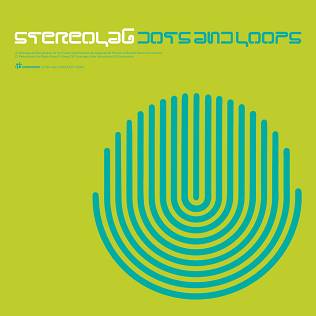
Dots and Loops is the fifth studio album by English-French rock band Stereolab. It was released on 22 September 1997 and was issued by Duophonic Records and Elektra Records. The band co-produced the album with John McEntire and Andi Toma, and recording took place in Chicago and Düsseldorf. The album explores jazz and electronic sounds, and is influenced by bossa nova and 1960s pop music. Its lyrics address matters such as consumerism, the "spectacle", materialism, and human interaction.
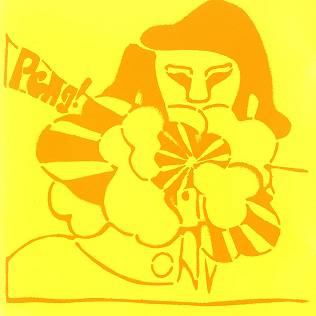
Peng! is the debut studio album by English-French rock band Stereolab. It was released on 26 May 1992 by Too Pure in the United Kingdom. The album was issued in the United States on 13 June 1995 by Too Pure and American Recordings. A remastered edition of the album was released on 9 November 2018 by Too Pure and Beggars Arkive.

Timothy John Gane is an English songwriter and guitarist who co-founded Stereolab with his then partner Lætitia Sadier.
Duophonic Ultra High Frequency Disks Limited is a British independent record label formed by English-French rock band Stereolab in 1991. The label has two imprints: Duophonic Ultra High Frequency Disks for UK Stereolab releases licensed to various labels worldwide, and Duophonic Super 45s for releases of other artists and certain Stereolab UK-only releases. Duophonic's first release was Stereolab's debut EP Super 45 (1991), limited to 880 copies; of these, forty copies had handmade covers that were produced by Martin Pike in his father's garage.

Lætitia Sadier is a French musician, best known as a founding member of the London-based avant-pop band Stereolab. In 1996, while Stereolab was still active, she formed the side project Monade. In 2009 — the same year Stereolab became inactive — she ended the Monade project and began to perform solo work under her own name; her current band is known as the Lætitia Sadier Source Ensemble. She has frequently performed guest vocals and collaborations with other artists.

Mars Audiac Quintet is the third studio album by English-French rock band Stereolab. It was released on 2 August 1994 and was issued by Duophonic Records and Elektra Records.

Emperor Tomato Ketchup is the fourth studio album by English-French rock band Stereolab. It was released on 18 March 1996 and was issued by Duophonic Records and Elektra Records.

Sound-Dust is the seventh studio album by English-French rock band Stereolab. It was released on 28 August 2001 in North America by Elektra Records and on 3 September 2001 internationally by Duophonic Records. The album was produced by John McEntire and Jim O'Rourke and recorded at McEntire's Chicago studio Soma. It was Stereolab's last album to feature singer and guitarist Mary Hansen, who died in a biking accident the following year.
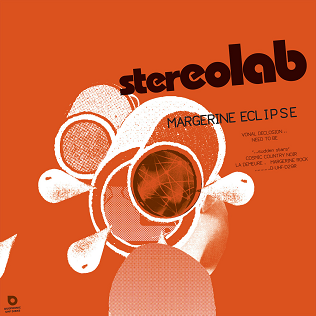
Margerine Eclipse is the eighth studio album by English-French rock band Stereolab. It was released on 27 January 2004 in the United States by Elektra Records and on 2 February 2004 in the United Kingdom by Duophonic Records. The album is in large part a eulogy to former band member Mary Hansen, who died in 2002.

The First of the Microbe Hunters is the fifth EP by English-French rock band Stereolab. It was released on 16 May 2000 in the United Kingdom by Duophonic Records and in the United States by Elektra Records. Its title makes reference to the book Microbe Hunters by Paul de Kruif, in which the first chapter is dedicated to Dutch scientist Anton van Leeuwenhoek, named "the first of the microbe hunters".

The High Llamas are an Anglo-Irish avant-pop band formed in London circa 1991. They were founded by singer-songwriter Sean O'Hagan, formerly of Microdisney, with drummer Rob Allum and ex-Microdisney bassist Jon Fell. O'Hagan has led the group since its formation. Their music is often compared to the Beach Boys, a band he acknowledges as an influence, although more prominent influences were drawn from bossa nova and European film soundtracks.
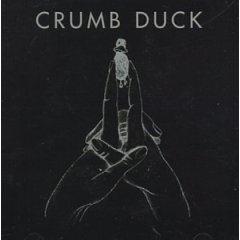
Crumb Duck is the first collaboration between prolific Anglo-French indie band Stereolab and cult avant-garde unit Nurse With Wound, first released on 10" vinyl on the Clawfist label in 1993.
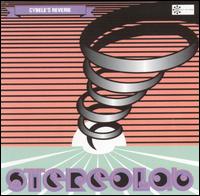
Cybele's Reverie is an EP by English-French rock band Stereolab, released on 19 February 1996 by Duophonic Records. Its title track serves as the lead single from their fourth studio album Emperor Tomato Ketchup. The four-track EP is the only one by Stereolab on which none of the songs are in English: the title track, "Brigitte", and "Young Lungs" are in French, and "Les Yper-Yper Sound" is an instrumental.

Serene Velocity is a compilation album by Stereolab, released in late 2006. It focuses on material released during the band's Elektra years.

Space Age Batchelor Pad Music is an EP by the alternative music band Stereolab, originally released in March 1993. The release became an underground sensation, and led to the band snagging its first major-label record deal.
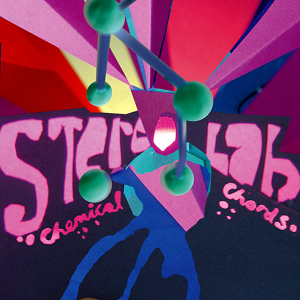
Chemical Chords is the ninth studio album by English-French rock band Stereolab, released on 18 August 2008 by 4AD and Duophonic Records.

Not Music is the tenth studio album by English-French rock band Stereolab, released on 16 November 2010 by Drag City and Duophonic Records. The album is a collection of unreleased material recorded at the same time as their previous album Chemical Chords (2008).

Transient Random-Noise Bursts with Announcements is the second studio album by English-French rock band Stereolab. It was released on 24 August 1993 and was issued by Duophonic Records and Elektra Records.



















